By Lambert Strether of Corrente.
When I blegged for a link to Lance DeHaven-Smith’s Conspiracy Theory in America (CTA) I was overwhelmed by reader response, both in comments and in mail. (I will not single out individuals, especially on such a topic; you know who you are!) So I consider myself under an obligation to review it. CTA (University of Texas Press, 2013) is both short and wonderfully lucid, with a full scholarly apparatus; I recommend it highly.
Now I must immediately pause to issue the following warning, which will explains why I was coy about putting the fully spelled out title of CTA in the post title: I didn’t want it “CT” to come up easily in search, and if it does, I want only the coyly implicit caveat of asterisks to appear.
COMMENTS WARNING
This is not a post for you to dilate or expound on your favorite CT, whether in Dallas, in Manhattan, in a Chinese wet market, a laboratory, leaky or otherwise, or where- and whatever. Don’t bring them up. And don’t tell me you’re not sure what I’m talking about. Plus if you’re not sure, don’t. Our vicious but fair moderators will nail your head to the floor if you do. I am enforcing this policy for three reasons:
1) CT is almost impossible to moderate; the topics seem to exert an irresistible pull, and we end up (to mix and remix metaphors) with a rat’s nest of yarn diagrams stuffed down a rabbit-hole;
2) Because CT is stigmatized in “the discourse,” discussing it incurs reputational damage for the site. If we’re going to risk that, we’re going to do it to get some evil-doer fired from CalPERS, or to protect y’all in a pandemic, not on extinct matters of purely historical concern. There are other places to indulge yourself in CT. Go there.
3) DeHaven-Smith’s purpose in writing the book is to replace CT with a what he calls a policy science of State Crimes Against Democracy (SCADs):
In contrast to conspiracy theories, which speculate about each suspicious event in isolation, the SCAD construct delineates a general category of criminality and calls for crimes that fit this category to be examined comparatively.
4) And don’t game this warning by asking “Gosh, could it be that this [a historical event in Dallas, say] was really a SCAD?” Because our moderators will know. This is not a post for enthusiasts. There are many very contemporary and not yet stigmatized and worked-over events for which the SCAD framework may well be appropriate (and on both sides of the aisle). Do that.
Lance DeHaven-Smith is a political scientist at Florida State University’s Askew School of Public Administration and Policy. He is the author of scholarly articles and books including Atlas of Florida Voting and Public Opinion (1998; I have read, but cannot now track down, that observing Jebbie’s election theft in 2000 “radicalized” him, as we say these days). CTA and its central concept of SCADs are the fruit of research beginning at least as early as 2006.
In this review, I will be posting lots of screenshots from a CTA PDF, with highlights in yellow. (I’ve tried to keep the typesize in each shot sized consistently, but I seem not to have entirely succeeded. First, I will present DeHaven’s thesis that “CT,” the phrase, was likely propagated by the CIA (!). Then, I will present material that shows that “conspiracy” has an honored place in American political thought, from the Framers of the Constitution onward. Next, I will look at CT as rhetoric. Finally, I will compare CT and SCADs, and look at SCADs as form of corruption. Again, all the screenshots are DeHaven-Smith, bracketed with short remarks from me.
Was “‘Conspiracy Theory’ Propagated by the CIA?
Just asking questions… DeHaven cautiously puts the CIA material in an Appendix, but being an etymology and meme fan I found it so intriguing that I’ve moved it up front in this review. Here (CTA, page 197) is CIA Dispatch #1035-960, which introduces the context (Dallas) and introduces the term “conspiracy”:
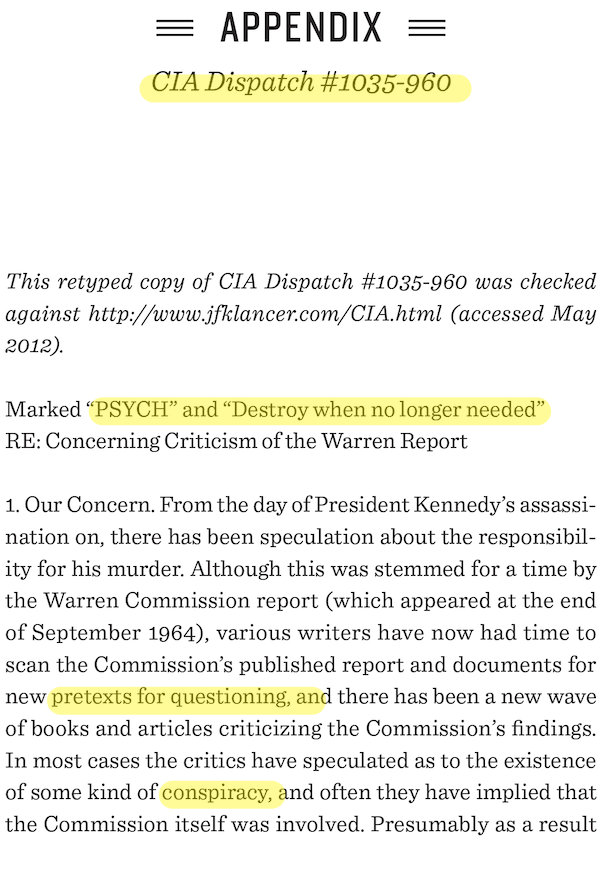
(I love the spin of “pretexts for questioning.” That’s real Greatest Generation stuff there.) Next, the terms “conspiracy theories” and “conspiracy theorists” are invoked (page 198):
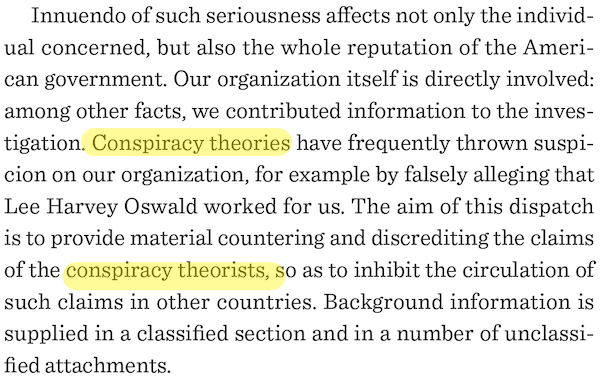
Finally, a domestic propaganda campaign is sketched (199):
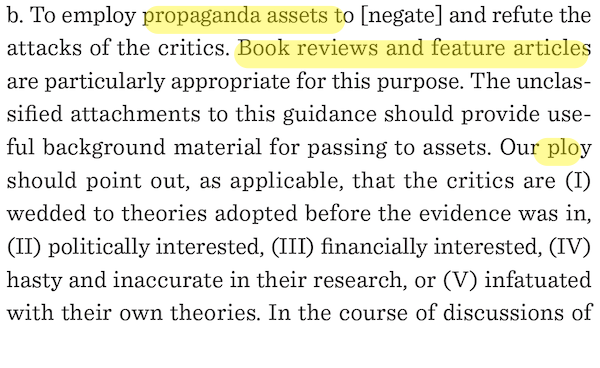
Those of you who noticed the phrase “examined comparatively” may have also noticed the tern “propaganda assets,” which seems quite up to date (looking at you, David Ignatius. And not just you). “Ploys” (I) through (V) also seem quite current.
Now, while the provenance of the memo is clear, it’s not clear that the CIA invented the term[1], although we do have a suggestive coincidence in dates of propagation[2]. DeHaven-Smith summarizes:
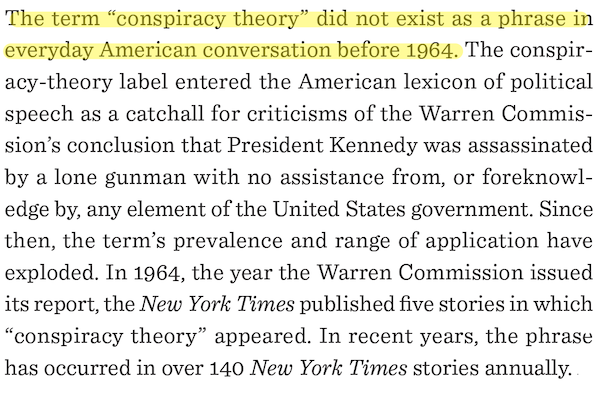
“Conspiracy” Has an Honored Place in American Political Thought
DeHaven-Smith urges that the Declaration of Independence was based on conspiracy (page 7):
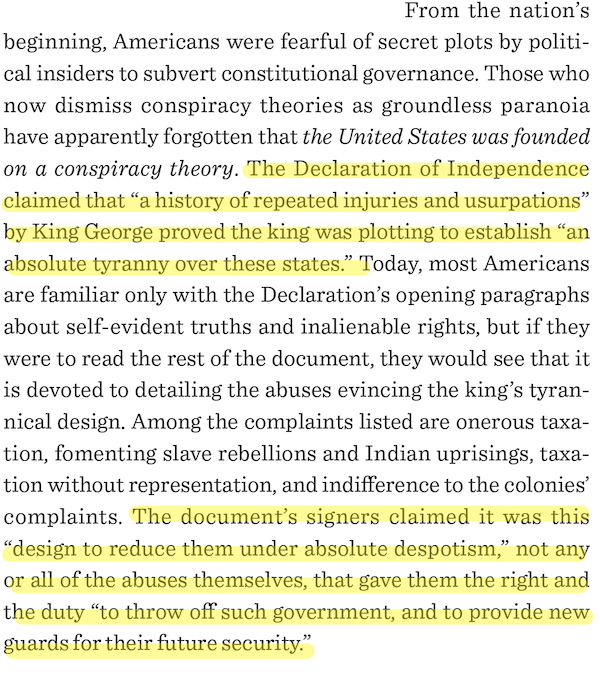
In the Federalist Papers, Madison et. al conceptualized the operation of factions in conspiratorial terms, and designed the separation of powers accordingly (55):
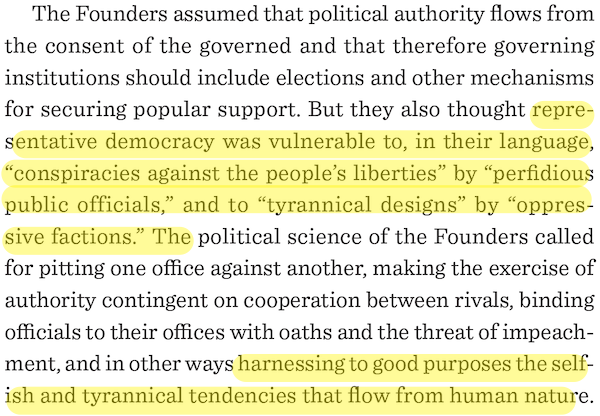
Lincoln’s methods for arguing against Polk’s Mexican War (75) sound very like the Kreminology of today:
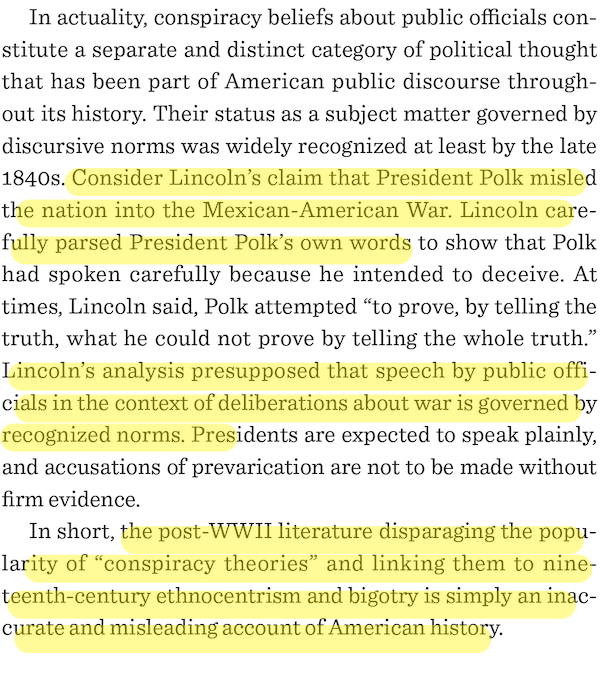
CT as Rhetoric
An accusation of CT is a conversation stopper (one might even say a “national converation” stopper). Page 11:
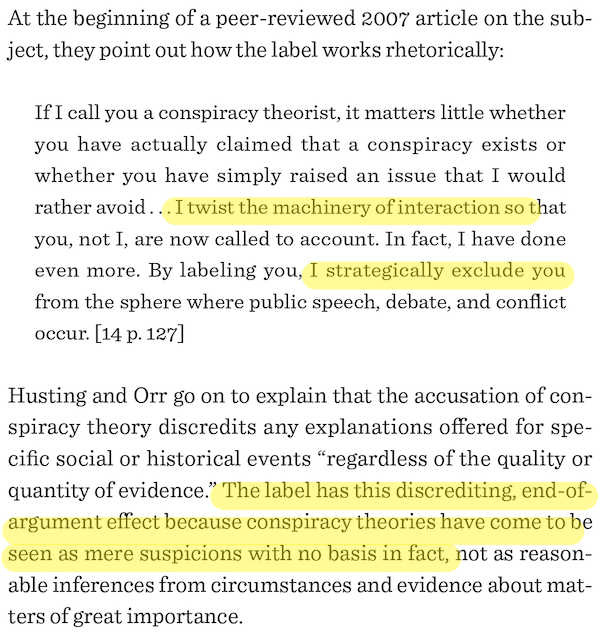
As such, it functions as a “defense mechanism” for political elites (9):
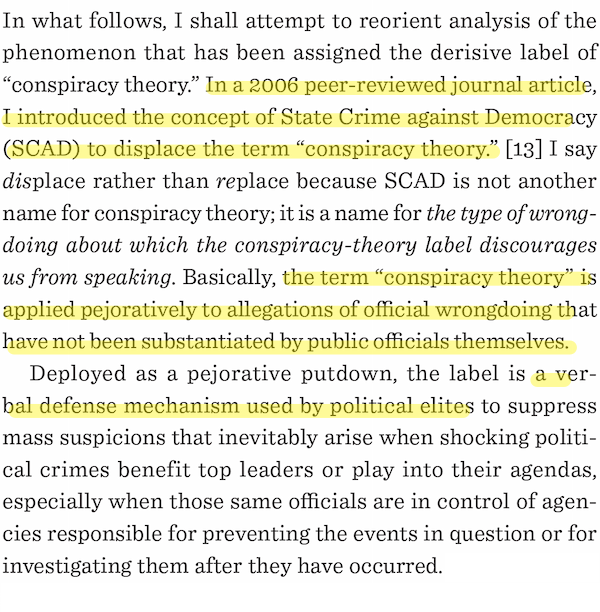
(CT seems to have developed other functions not originally conceptualized by the organs of state security; “yarn diagrams,” I call them, which develop a fan base, serve as a breeding ground for brainworms like “lizard people,” etc. Heaven knows elites, or some elite factions, may be like lizards. But they are not, actually, lizards, not creatures from a distant star, etc. We can look at such cray cray as an energy-sucking and disempowering form of citizen science, albeit political science. It’s as if we were all going out to study aerosol transmission not with CO2 meters, but with crystals, then spending time carefully recording the changing reflections and colors of the facets in notebooks, and then putting the results in GoogleDocs online for others to ponder and comment on. Save the crystals for the lizards.)
The difficulty here is that some sequences of events, categorized as CT, are, well, true (6):
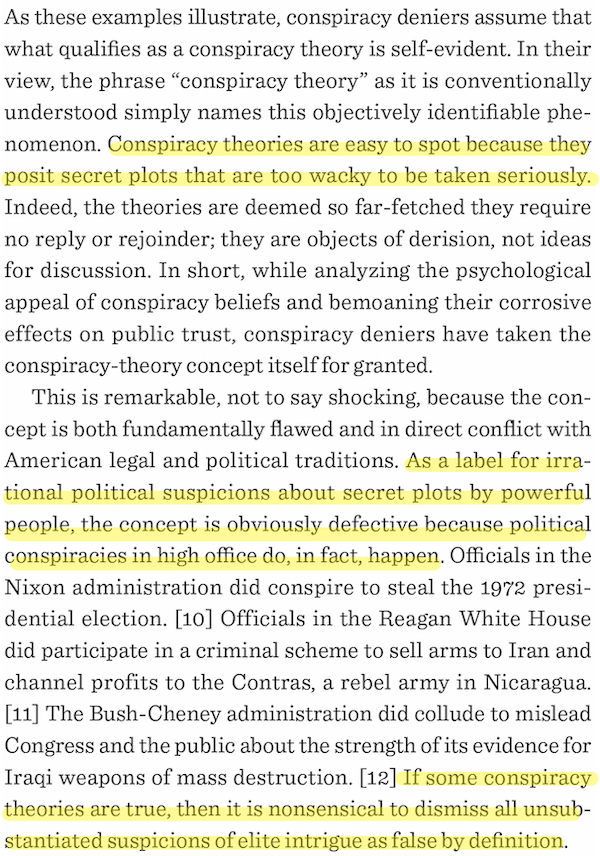
Now we turn to SCADs, which provide a form of citizen political science with a stronger methodology than CT.
CT vs. SCADs
The difficulty with CT, as a methology, is that it focuses on (powerful, bad) individuals, and not on institutions (8):
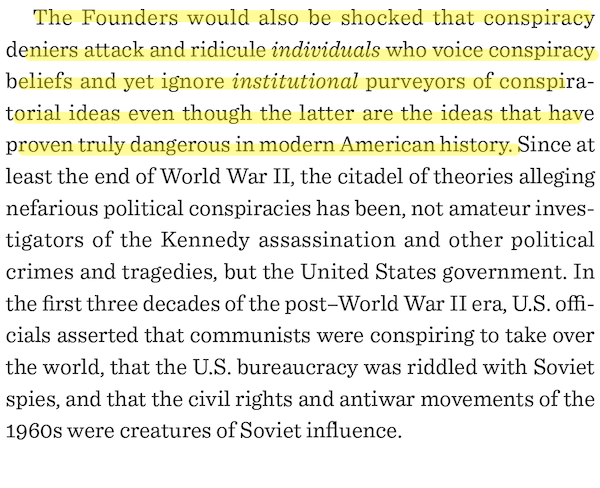
SCAD, by constrast, focuses on groups of individuals acting within institutions (12):
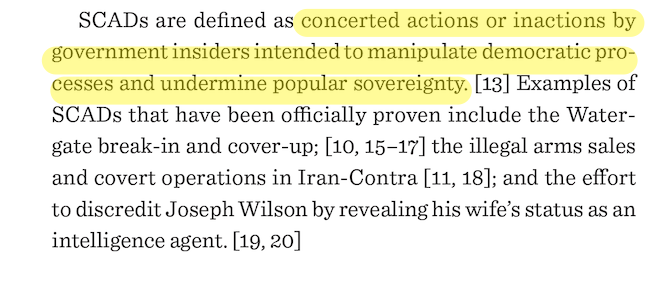
(Thinking about the relationships between individuals and groups also allows us to deploy analytical tools like “Flex Nets” (Wedel) and social capital (Bourdieu)), comparatively.
SCADs can be characterized as crimes within institutions (12):
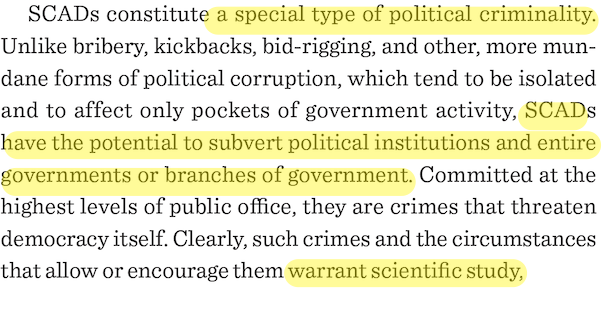
The Framers understood SCADs to be “high crimes” (11):
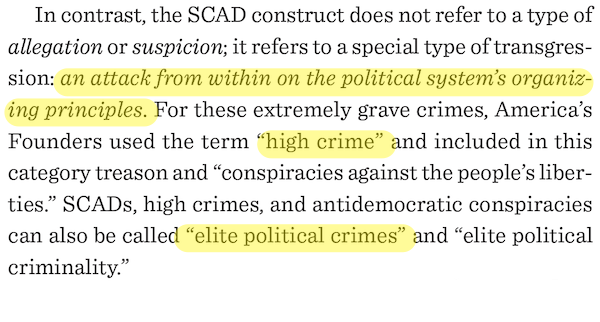
SCADs Are a Form of Corruption
Elections seem to draw SCADs like flies (139):
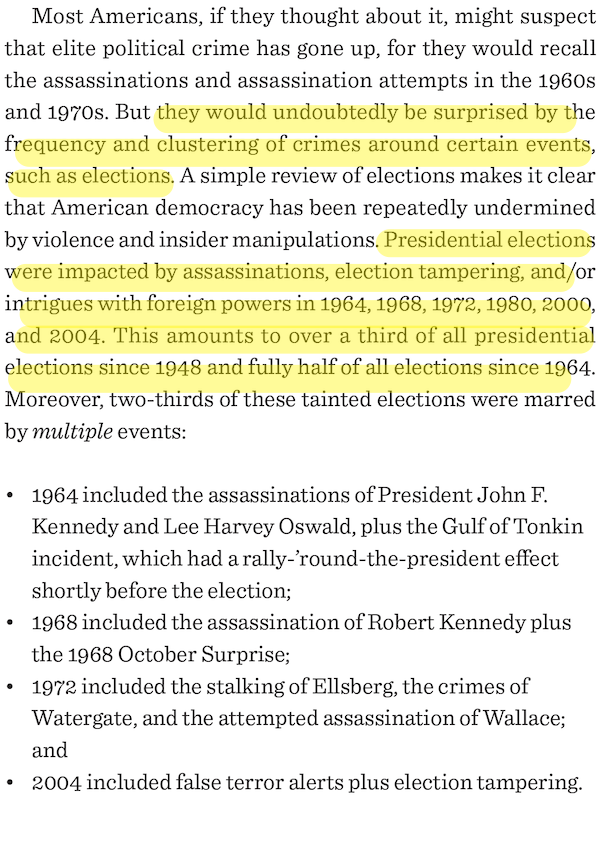
(I like very much framing SCADs as corruption, because that means SCAD analysts can deploy the work of scholars like Zephyr Teachout.)
In fact, the political history of the United States can be periodized according to the types of SCADs involved (204-205). The two screenshots that follow are facing pages, which neither PDF nor I handle at all well:
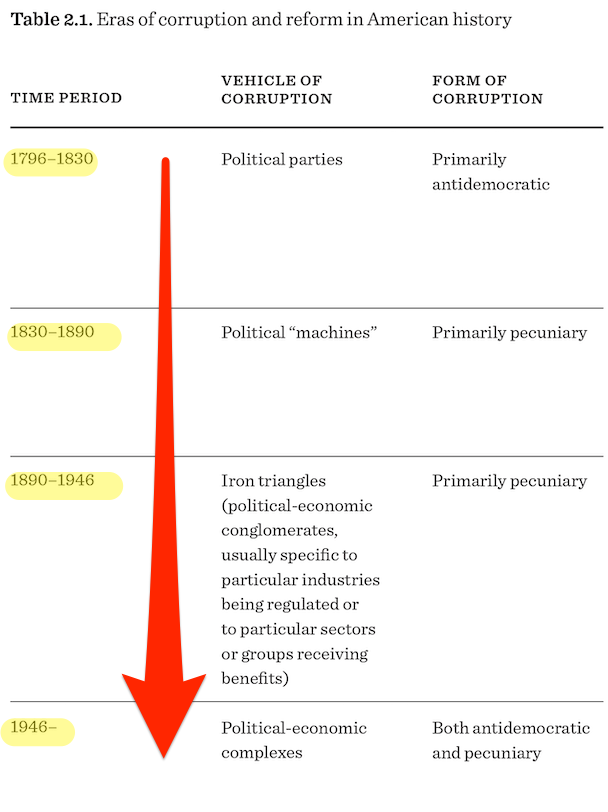
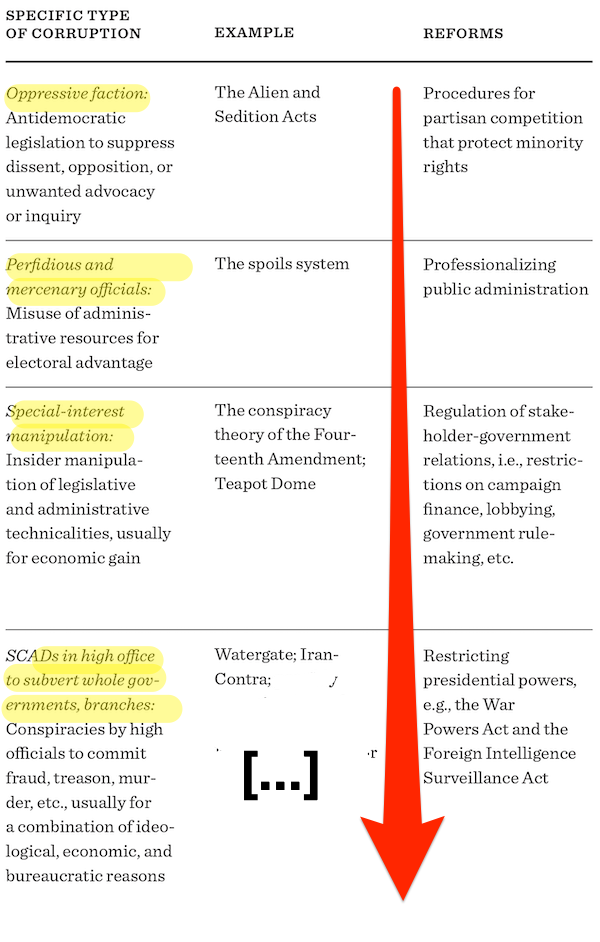
Conclusion
DeHaven-Smith provides the following definition of “the political class” (69), which interests me since while I’ve encountered the term often in my reading, I’ve never seen it so carefully defined:
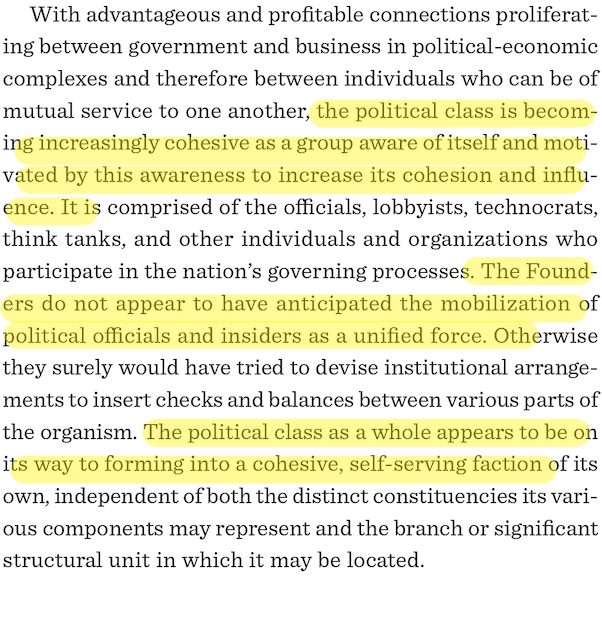
(I would add the press to his “cohesive” “group aware of itself.”) Obviously, if the Framers had envisaged the emergence of a “a political class” they would have set up an immune system in the form of checks and balances (“ambition must be made to counteract ambition”) for it, as well as the three branches of government. As it is, we have a political class that doesn’t even need to evolve immune escape from the, as it were, T-cells of the Constitution. Certainly SCADs emerging from the political class — *** cough *** CDC ***cough*** — have shown their ability to infect the entire body politic rapidly, and with little resistance. Perhaps DeHaven-Smith’s work will enable citizen political scientists to do something to disempower the polymorphous perversion of political class without institutional boundaries, by providing better — institutional, relational, comparative — analytical tools.
NOTES
[1] Here is an usage of the term in a dissertation from 1960:
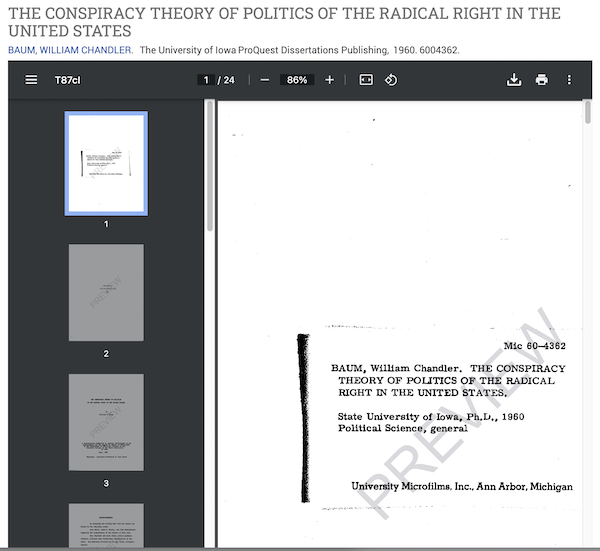
[2] But here is a Google ngram showing the term taking off:
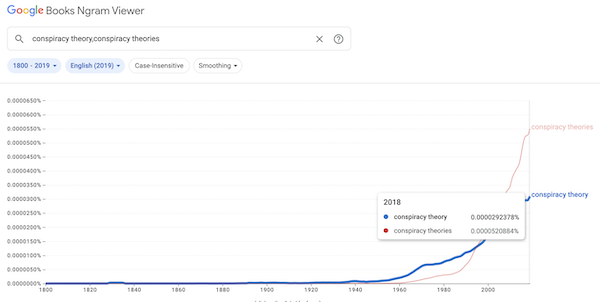


This book review was very helpful in clarifying terminology and concepts as I consider this news today from The Olympian: Open government activist settles lawsuit with WA Redistricting Commission for $40,000
The Political Class is absolutely the correct framing. Thank you Lambert, for this wonderful 16th Birthday present to NC readers.
I spent 34 years as a prosecutor in a major jurisdiction (known colloquially as S*l*c*n V*ll*y). I was a professional C********y T******t. In addition I was the Treasurer of an association collectively bargaining on behalf of the prosecutors and public defenders (talk about a conspiracy!) and saw inside the kimono of California politics.
For me as a prosecutor, it was axiomatic under the common law of Conspiracy that I did “…not have to prove that any of the members of the alleged conspiracy actually met or came to a detailed or formal agreement to commit one or more of those crimes. An agreement may be inferred from conduct if you conclude that members of the alleged conspiracy acted with a common purpose to commit the crime” and that “A member of a conspiracy does not have to personally know the identity or roles of all the other members.” [CA Pattern Jury Instructions]
The class solidarity of the Political Class is a real thing. Their class solidarity is not expressed in some Bond-villain SPECTRE meeting hall. It is expressed on the sidelines of lacrosse matches and soccer games; in luxury boxes at sporting events or Stones concerts; at charitable and political fundraisers; etc.
Definitely intrigued by this post!
But……..but…….but………but, what about the unspeakably despicable, “State Crimes Against OUR Democracy (SCAODs)”?
Still chewing on this conceptually, but I see that DeH-S limits State Crimes Against Democracy (SCAD) to High Crimes such as Watergate and Iran-Contra. There is also a panoply of lesser inchoate c**********s that DeH-S classifies as Oppressive Faction, Perfidious and Mercenary Officials, and Special-Interest Manipulation which the Political Class as a “cohesive, self-serving faction” utilize to promote their mutual material benefit.
The Political Class is made-up of Our Billionaire Overlords and their PMC servants in government/military, academia, media, and finance. Their rise dovetails with the recent 60-year explosion of the global population from 2.5 billion to 8 billion and the resultant increased competition for dwindling natural resources and lebensraum creating an imperative to ration and hoard.
The Political Class do not constitute a “State.” Rather they make up a “Caste” within society. I think that the SCAD framing is too limiting even though it is quite descriptive of the reality of the Political Class excluding 90 percent of the population from material security by subverting mass political participation. This is a Caste War.
I have seen it up close at CalPERS where the “skim” is presumed by the Political Class, who at all levels express no interest in policing the trust fund’s losses caused by extractive rents.
Thank you for highlighting this very worthwhile work. I can think of few books that are more relevant to a wide range of the issues discussed here at NC daily.
Your words summarize nicely: “An accusation of CT is a conversation stopper (one might even say a “national conversation” stopper)…. As such, it functions as a “defense mechanism” for political elites.”
Many of the conspiracies mentioned in the book refer to events that were major turning points in history. Yet for most academics and mainstream “journalists,” it is career suicide to examine them professionally beyond the official narrative, or even acknowledge them as serious topics. This has resulted in a criminal distortion of our understanding of this history. I know this first hand as someone who spent most of his life in academia. Lance DeHaven-Smith deserves high praise for giving legitimacy to studying such an important ideological tool. And credit to UT Press for publishing it.
Of course there are many CTs that *are* “too wacky to be taken seriously.” As De Haven-Smith notes, a major strategy is to conflate those backed by considerable evidence with the “wacky” ones, a task made much easier by this pejorative term. His alternative – SCADs – is very useful, in that it highlights what the “CT” charge seeks to cover up.
Jared Diamond managed to write “Upheaval” – a book about sudden change in society – and discuss Pinochet’s rise in Chile and the purge of Communists in Indonesia in 1965 without mentioning the CIA at all.
Apparently Allende just pushed his luck too far with the Chilean right wing, and some lone actors inside the Indonesian army just wanted to purge Commies in 1965.
My understanding is that in colonial and early U.S. America the gentry (including the Founders) WERE the political class. As IIRC Gore Vidal said about today’s rich, they didn’t need to conspire because they were all on the same team already.
More seriously, where do you draw the line between conspiracy and political maneuvering? Did (say) FDR conspire to get the U.S. into WW2? He didn’t openly say in 1939 that Nazi Germany was a danger to the U.S. and that he wanted the U.S. to enter the war on the British side. He went through years of Neutrality Patrols, Lend-Lease etc. Of course ultimately the Japanese and Hitler handed him what he wanted, but what if they hadn’t?
Did you fail to read the note about comments at the top?
Did you fail to read what I actually wrote?
Diptherio is suggesting that you are being remiss by fully spelling out the “C-Word” as requested by Lamberth.
I think you got the pictures in the notes mixed up.
Fixed, thanks.
Information Disorder Syndrome and Its Management
Nirmal Kandel
https://pubmed.ncbi.nlm.nih.gov/32417871/
Abstract
“Many of us may be unknowingly suffering from information disorder syndrome. It is more prevalent due to the digitized world where the information flows to every individual’s phone, tablet and computer in no time. Information disorder syndrome is the sharing or developing of false information with or without the intent of harming and they are categorized as
(1) misinformation,
(2) disinformation and
(3) malinformation.
The severity of the syndrome is categorized into three grades. Grade 1 is a milder form…….”
similar to “Oppositional Defiance Disorder”…which, thankfully, wasn’t around when i was an antiauthoritarian, freethinking youth.
the strange juxtaposition…first on the Right…of “America!” and “Freedom!” with “Conform or be beaten up!” has always intrigued me.
all those coldwarrior koreanwar vets with their large flags, warning us about how the Commies are “marching in lockstep”, subject to Internal Passports and all…while pining for the very same thing to be brought about here.
ergo…and per that Canadian Guy’s “The Authoritarians”…there’s a lot of psychology in all this…projection, fears of inadequacy, etc.
> Oppositional Defiance Disorder
No doubt there are pharmaceuticals for that…..
I’m just about finished with the excruciatingly detailed account of the adoption of the US constitution, The Framers Coup, by Michael Klarman. As you might guess from the title, Klarman asserts that the framers acted in a manner inconsistent with US mythology. My brief summary is that the writing and adoption of the constitution was the result of a conspiracy (as described so well in the comment from David in Santa Cruz) by the Federalists to assure that the US would always be under the direction if not the outright control of the “best people”. Those being the holders of the most property with the most to gain from frustrating any democratic aspirations of the rest of the people. So the notion that somehow the constitution provides for the correction or limitation of the political class seems yet another does not stand up to very close inspection.
Consider reading the post. The topic under discussion is replacing CT with SCAD. Of course, the revolutionary overthrow of British rule was, in fact, a crime…
I found the book’s discussion of Karl Popper and Leo Strauss enlightening. Who knew that Strauss was a big fan of “Gunsmoke”?
So what kind of check or balance could we institute against this self-unifying tendency of the political class? I like the idea of an immense House of Representatives, with each rep living within walking distance of his constituency of about 1,000 voters. Philosophically, I wouldn’t wish to dispense with a brilliant PMC, but they should be kept on an extremely short leash locked on an iron collar — figuratively speaking.
Actually — little known history — they did do that.
https://www.registercitizen.com/opinion/article/Don-Pesci-New-research-shows-Connecticut-signed-12010185.php?fbclid=IwAR34ztcbZ3vUErR8_qIZi37s2IAsLbauOhnjUi_2-G3wuowd2YnrzNrLl7E
https://en.wikipedia.org/wiki/Congressional_Apportionment_Amendment
> I found the book’s discussion of Karl Popper and Leo Strauss enlightening. Who knew that Strauss was a big fan of “Gunsmoke”?
I did leave that part out. That’s because I have an aversion to intellectual history that treats ideas as schematic without showing how they were actually propagated, and in which circles.
The only thing to balance the political class as such against, is the people as a whole.
I think the Swiss has managed fairly well with their system of popular initiated referendums on all political levels. Not that it’s free from corruption, but if it gets bad enough the people can change the rules without having to rely on cracks within the political class.
Lambert, you may also find Erica Lagalisse’s short book Occult Features of Anarchism With Attention to the Conspiracy of Peoples published in 2019. She includes an excellent discussion of the deployment of the term “CT” as a conversation stopper and means of driving away people who do not share the same views even if they are in fact open to real discussion and consideration of evidence. Her PhD thesis is very good and readable (seriously) too. She maintains a website too:
https://lagalisse.net/
It’s starting to feel like “conspiracy” is a triggering word. which people really need to abandon entirely.
The point of DeHaven’s book, and of this post, which you should consider reading, is not to restart a CT “conversation” in the mode of “real discussion,” but to replace CT entirely with a methodologically superior alternative.
Imagine if we had tried to analyze the crimes of the Great Financial Crash with “conspiracy” as an analytical tool, instead of Bill Black’s Accounting Control Fraud!
Hmm, clearly my description of Lagalisse’s book was inadequate. I see it as complementary to your book review above (which yes, I read), and her point was also that CT is not useful terminology in analysis, it’s just that she got there via a different route in anthropological research, which I accidentally failed to note, hence the inadequate description. Hopefully this clarifies things and provides reassurance I was not seeking to topic hijack.
Au contraire the controlling word is “theory”–meaning it’s just your opinion. And it should be. Personally I don’t believe the CIA killed Kennedy but we all should be open to proof as opposed to suspicion.
The establishment are just playing Overton Window games. IMO (my theory).
in popular/Mundane usage….”Theory” actually denotes “Hypothesis”.
remember the memes of the guy hanging from a cliff:”Gravity…its just a theory”.
but “Theory” actually denotes more or less settled science…inasmuch as science, per Popper, can ever be “settled”.
i have no idea of the provenance of this misapplication of “Theory”…not paying attention in freshman year science class?
but in this context, it seems pretty important.
> i have no idea of the provenance of this misapplication of “Theory”
It’s in the post; CIA Dispatch #1035-960. It makes sense that a CIA-propagated concept would be untrue all the way down. (Since reasoning from contradictory premises can yield any result, perhaps this confusion is one reason CT is so virulent in its ability to propagate?)
My problem with SCAD as a replacement for CT in popular speech is that it doesn’t exactly trip off the tongue. I think that for a while “Watergate” was used with this meaning but eventually everything became a “-gate.”
Well, maybe, but there are scads of SCADS.
You don’t have to unpack it, it works as a name.
If people can remember COVID, SCADS can catch on. The geezer in me prefers High Crimes.
> it doesn’t exactly trip off the tongue.
I disagree. Starts with a sibilant, ends with a stop consonant. Clearly an acronym, and in fact sounds rather like the weapon it is. I think “SCAD” is fine.
I think “-gate” is parallel, but I think it connotes a scandal, rather than a high crime.
“Obviously, if the Framers had envisaged the emergence of a “a political class” (sic) they would have set up an immune system in the form of checks and balances (“ambition must be made to counteract ambition”) for it, as well as the three branches of government.”
I believe it’s reasonably clear that Madison at least, the chief architect of the Constituion, DID foresee the emergence of a political class as distinct from the propertied class. (At the time of the framing, they were essentially interchangeable.) Moreover, he saw it as a fundamental problem. I.e., that in future, those with political rights but not wealth might arise and present a threat to those with both and that it was an eventuality to be guarded against.
Or, as he put it: ” The landed interest, at present, is prevalent; but in process of time, when we approximate to the states and kingdoms of Europe; when the number of landholders shall be comparatively small, through the various means of trade and manufactures, will not the landed interest be overbalanced in future elections, and unless wisely provided against, what will become of your government? In England, at this day, if elections were open to all classes of people, the property of the landed proprietors would be insecure. An agrarian law would soon take place. If these observations be just, our government ought to secure the permanent interests of the country against innovation. Landholders ought to have a share in the government, to support these invaluable interests and to balance and check the other. They ought to be so constituted as to protect the minority of the opulent against the majority. The senate, therefore, ought to be this body; and to answer these purposes, they ought to have permanency and stability. Various have been the propositions; but my opinion is, the longer they continue in office, the better will these views be answered”
https://founders.archives.gov/documents/Madison/01-10-02-0044
I’m thinking the the American framers of the Constitution would understand the idea of a “political class” as an analogue to what they would have recognized as “a Court,” as in “The Court of St. James.” That perhaps is one reason why some of us use the concept of “The Aristocrats,” (not the joke,) as a descriptor for the ‘modern’ political class. Also, the bleed through from distinct circles of association, such as Financial Elites and Political Elites into each other does not negate the overarching concept of a “political class.” The sub units can be viewed as exactly that, components of a greater whole and not to be confused with the idea of a Guiding Elite. The ‘Political Class’ can be seen, paradoxically, to be a true co-operative.
Is there a better example of a SCAD in this century than Russia gate? And is there not a better example of trying to use “CTA” to stigmatize and discredit than to say any defense of Trump exclusively deals in CTA? Not to mention that anyone who brings up any concerns about our software driven elections is dealing in CTA?
And the infinite irony of the people involved in what may be the most outrageous SCAD in recent memory than using CTA against any counter arguments – well, either fantastic genius or incredible chutzpah
Good question about the SCAD of the century. Figure 5.2 in the book is a bar graph displaying the number of SCADs and possible SCADs in the USA from 1790 to 2010, by decade. It shows that crimes against democracy with “wide government complicity”increased dramatically in the first decade of the 21st century.
If deHaven-Smith’s SCAD chart were to be updated to cover the last 10 years since the book was published, what kinds of trends do you think we would see? Analysis like this would be very useful.
One of the other patterns that the research revealed to deHaven-Smith was that since WWII, “The main effect of most SCADs and suspected SCADs has been to foster social panic and militarism in the American mass public and belligerency in U.S. foreign policy.“
This book made a lot of good connections, which was its point. Thanks Lambert for posting about it.
One thing I am unclear about is whether the book regards SCAD as exclusively domestic (we are only talking about the US) or are we talking about CIA actions against other countries? I get the impression the book is only talking about the US, but the same people perpetrating SCADs domestically are the same ones perpetrating SCADs internationally…
That’s my question too. Also, there have been plenty of countries targeted for overthrow via black ops that would be considered republics, not democracies (including the U.S., at least according to Franklin). Their sovereignty was attacked, not their “democracy”. And meddling in the internal affairs of other countries has often been rationalized and/or justified as “bringing democracy”, I.e., for their own good.
So, “SCAD” seems perhaps too limited in scope.
It is definitely too limited. Most of what Chomsky has written about for decades were war crimes and crimes against humanity committed by the U.S. or its allies with US support. No high ranking American is ever held to account. The idea is taboo in political circles. PMC concern about “ our democracy” and “ the rule of law” is entirely about domestic concerns and even then the focus is solely on what the Trumpists did ( both the real and imaginary crimes).
If Americans ever applied the rule of law towards US war crimes, a great many high- ranking officials and politicians would have to worry about going to prison. It would be equivalent to a revolution. The mainstream press would also be discredited, because they devote orders of magnitude more attention to the war crimes of our enemies than to those committed by our friends or ourselves. It is an issue whose implications are so enormous it can’t be taken seriously. The closest you come in the mainstream are the occasional references to Kissinger as a war criminal and to torture under Bush as a war crime, but as soon as Obama got into office he nixed the idea of holding the CIA accountable. The CIA spied on the Democrats in Congress when they were investigating torture and Obama let that pass as well.
Thanks to Lambert for this post. I believe I recall coming across that 2006 article by L. dehaven-Smith (probably here) in the past and thinking it seemed helpful.
Perhaps any one term can’t cover all aspects (for example, COVID19 doesn’t really cover the dangers of long covid and of damage to the immune system resulting in worse secondary infections).
With SCADs it’s true that the actors behind a SCAD are not necessarily restricted to one State Gov’t. Moreover I think most SCADs are “public private partnerships”. That is, ideas about what needs to be done may be discussed in many elite circles including Foundations and Conferences, but also informally in many exclusive venues (golf clubs, etc). In recent years international ties seem more common.
While an institution like a clandestine state security agency may often be a primary actor, I suspect plausible deniability is usually maintained and exclusive use of any one agency is rare.
On a different tack, I recall two books that may be relevant here. One was the Pike Report, the other, Confessions of an Economic Hit Man by John Perkins. The Pike Report was done by the US House Pike Committee around the same time the Church Committee was investigating similarly in the US Senate. What I recall from my reading decades ago was that the C*A budget was primarily 2 sections, one might be called black ops, but the other was buying news reporting that is propaganda. Clearly use of black op techniques is a SCAD. I would argue that, while fewer die directly, use of techniques like propaganda move the narrative and the Overton window – much as the term CT was used in articles and interviews to discredit and end discussions, to warp the truth as it were. To me this is also a SCAD.
The other book by Perkins discusses some various techniques (in his book used international, but I would argue there is no reason to assume they are not also used domestically) used to manipulate government policies. Perkins described how economic policy is used to maintain the desired government policies. He wrote when economics fails assassinations and wars are the next steps. Pike shows information or news and opinion pieces are the step before economics.
I guess I am arguing for a wide spectrum definition of SCADs that includes the whole range from propaganda to economic policies all the way to black ops.
> I get the impression the book is only talking about the US, but the same people perpetrating SCADs domestically are the same ones perpetrating SCADs internationally…
The book does, but I think you’re right [sings: “We’re bringing the war / back home…”].
Here’s one take: in a “democracy” the people should have information about, and some say in, what their government is doing in/to other countries in their name. This is especially the case since such adventures – like Vietnam, or Ukraine – have significant effects on our own society. So our long-term efforts to destabilize Ukraine is a “SCAD” in the US because it was done with little to no “democratic” debate or decision-making, and much secrecy or disinformation. Such anti-democratic decisions are always justified by appeals to “national security” of course, as is withholding information about them from the public forever.
I’m jumping through a few hoops, but I like the term.
It is also a SCAD in Vietnam or any other country that is targeted.
I also think Assange’s main crime in the eyes of the US is revealing many, ongoing, SCADs around the world. Even the minor ones. Thanks to Manning and Assange I know that my government while privatising pharmacies was promising the US embassador that prices would not decrease. Surprise, that is not what they said in public!
Cablegate undermined the legitimacy of many governments by showing what they said in public and what they promised the US was two very different things.
One might quibble about if it is a crime against Democracy to pull the strings on a dictator like Mubarak. I would argue that it is. The Arab Spring showed the reaction when the truth came out. Pulling strings in secrecy allows regimes of various degree of democracy to lie to the public about the relationship to the hegemon, and thus prevent democracy from breaking out.
Great write up! Thank you! It’s on the list.
To the #DoomScroll!
If you look at early 19th c. America, the movement countering free-masonry could probably be seen as opposing a SCAD, and no doubt by mid-century the concept of a “slave power” is consistent with SCAD.
> the concept of a “slave power” is consistent with SCAD.
And rightly. Good catch! (See This Vast Southern Empire (reviewed at NC here) for why the Slave Power moved toward Secession when they lost their grip on the Federal government in 1860.
Has Aaron Goods American Exception been mentioned yet, I’m about half-way through it and it is also about the SCAD thing.
My hypothesis is that there are in reality no long running c********ies between various factions that create these distinct historical events.
There are only the interests of the individual factions and actors – these occasionally align to take advantage of temporarily optimal conditions.
The theory arises only in hindsight.
There is a concept called “emergent conspiracy” (“Old pros, they knew each other’s moves,” and so didn’t need to communicate, as LeCarré says somewhere.
However, again the very word “conspiracy” has its magical, erasing effect. SCADs, involving by definition state actors, are far more likely to demand planning. I don’t deny that emergent conspiracies exist — a worked example would be helpful — but the topic of this post is SCADs. I’d speculate we’re seeing one right now with intelligence community involvement in Twitter, for example.
1. i reckon Scads would be better kept in shadows for now, lest it get The Treatment…because this is a germane topic if we really want a better world.
2. i’d be curious how many posts the Mods have in quarantine, here,lol….it’s extremely difficult to discuss this without veering off into tangents and rabbit holes(my tongue hurts from the biting)
3. “as above, so below” is one of the lenses i use…it’s relatively easy to study the local elite’s machinations…Landed gentry, etc.
(I’m in the thick of such study right now, out here, in the wilderness….things moving under the carpet)
and then once one has a taxonomy/methodology for the Local Version, scale up the concept to region, state, nation and world.
4. “conspiracy” is literally “Breathing Together”…and it’s what humans do.
we are all of us, here, engaged in a conspiracy to better understand the Shape of the World, for instance…Big Oil, or whatever, “conspire” to maintain their position relative to the Rest of Us.
ever since i learned about that CIA memo, i’ve considered it the most effective conspiracy ever….(making “CT” into a round file by lumping relatively easily proven and obvious High Crimes in with Flat Earth and Lizard People in Human Suits)
forgot to add: C. Wright Mills, and the largely forgotten Herman Gross(“Friendly Fascism”, circa 1980) …along with folks like Erich Fromm, and…my introduction to metaanalysis of cultural formations…Joseph Campbell…all were inoculates against falling in to whatever CT du jour…from Robert Anton Wilson to Q(i suspect the former was deliberately out there, to make a point).
also, i find “quiet weapons for silent wars” a useful thought tool for understanding how the masses can be manipulated…society as circuit board, with diodes and capacitors and inductive currents and etc.
and to pound a little harder on that last point, PK Dick!
whatevers,lol…”conspiracy” exists…and, as i said elsewhere, can be readily observed in small, isolated places like where i’m at(back room at the Lions Club meetings)…the sophistication of the local elite would seem to necessarily pale in comparison to that of the bigger players, on grander scales.
one of the features of the still ongoing Russiagate, and its children…is how ravenous the memoryhole can be, and how willing so many people are to cast their fears, uncertainties and doubts into it.(again, see: Fromm)
on my local scale, this readiness to not see is evident in how quickly people forget what happened yesterday…if it harms the preferred Vision of this place as a quaint small town, a la Mayberry.
> how many posts the Mods have in quarantine
If you mean real posts, there are none in quarantine. If you mean comments, single digits.
SCADs are fractal, perhaps. At least under Federalism?
SCAD is an interesting concept, but one should remember the fact that the players in these events are both individuals and groups. Individuals act independently, but they are influenced by the groups they belong to and can belong to multiple groups simultaneously (economic, social, cultural, political, ideological, etc…).
If we take the current Twitter example we have interplay between:
Twitter as a company
Distinct departments within Twitter
Individual leaders in Twitter
Individual employees in Twitter
The FBI as an institution
Distinct departments within the FBI
Individual leaders in the FBI
Individual employees at the FBI
The media as an institution
Distinct companies within the media
Individual leaders in the media
Individual employees in the media
All of these actors have motivations that in this case aligned at a point in time to result in the events that did. The events however couldn’t have happened if the motivations and interests hadn’t occurred at the same point in time. The FBI wouldn’t have influenced Twitter if the right people hadn’t been in the right places at the right time, and if the events that Twitter censored hadn’t occurred.
In any case my hypothesis needs a thorough working through, as you say, on a specific case.
I guess another way of saying what I’m trying to say is that the narrative is what is important to both CT and SCAD. Both imply that a narrative is pre-planned by an actor (respectively individuals and institutions) – my concept is that the narrative can only be identified after events have occurred.
This is an interesting review indeed. I’d argue that SCAD may be best used as a way of avoiding the term “deep state.” SCAD seems to recognize that there is a corrupted bureaucracy that won’t go away and that serves its own interests relentlessly.
I’m not sure that the term “iron triangle” has been superseded, as one flowchart indicates. The successor term, “complex,” is harder to parse. And thinking about iron triangles, we have the current scandals at Twitter involving capital (Musk), the intelligence “community,” and what looks like the talky wing of the Democratic Party. Likewise, the failure of FTX, which involves an iron triangle of captured regulatory agencies, capital, and the talky wing of the Democratic Party. So you have the corrupted state bureaucracy involved in so-called private bureaucracies, all engaged in looting.
The term SCAD, though, may miss a dialectic: Opinions also arise from below. In Wu Ming 1’s book La Q di Qomplotto, which I recommend if you can read a “mattone” in Italian, he asserts that the thinking also involves regular people. He also points out that in Italian, teoria is a word that can’t be used to describe opinion. (Which seems like a valid point of view. Theory is not opinion.)
So Wu Ming 1 addresses some fantasie (as he calls them). The question I would have is how SCAD applies to more defuse abuses of power like the day-care scandals of the 1980s and 1990s, the Satanic ritual abuse scandals, and other abuses of power that ended up punishing innocent people. This theme also plays out in continuing charges of pederasty. Wu Ming 1 notes this and also shows how some Italian legal messes reflected these large phenomena of societal unease.
So SCAD helps in analyzing the phenomena. So would iron triangle, which is usually considered a poli-sci word and not much in current speech.
An underlying cause? Let’s not forget good ole breakdown of social trust, highly noticeable in U.S. society.
> I’d argue that SCAD may be best used as a way of avoiding the term “deep state.”
SCAD is premised on factional conflict. The “deep state” assumes a monolith, wrongly.
I think you are correct that “opinions rise from below (but are we sure of the origins of the Satanic ritual abuse scandals? Surely police were involved at some point).
However, if we look at sheer damage, whether the metric be body count or the quantity of the looting, SCADs are far more important. I think that the “S”tate involvement enables scale in a way that zeitgeist moral panics do not.
I like both terms. I don’t think “deep state” assumes a monolith. The CIA, FBI, and other “permanent state” institutions have clearly had factions over the years. E.g. the neocons set up a shop within the CIA to control intelligence and disseminate disinformation to justify the invasion of Iraq against its more objective analysts; something similar has occurred many times before. Secrecy and stove-piping (i.e. anti-“democratic” features) allow for the utilization of such institutions by factions for their own ends.
Some reviewers of De Haven-Smith have pointed out the similarities between ‘SCADs’ and Peter Dale Scott’s “deep politics.” Scott has also written a book about the “deep state.” In my opinion, Scott’s work is quite complimentary to that of De Haven-Smith.
I have read Peter Dale Scott and I don’t think much of his work.
Scott is mushy; DeHaven-Smith is lucid. There’s little complimentary about the two approaches (though I grant the seemingly profound “deep state” is a brilliantly conceived and highly infectious earworm).
Thanks for this, Lambert. It’s the PMC that’s behind all these. Mostly not because “evil” or ideology but simply because it’s how you get ahead: either doing what you’re told or not rocking the boat. “The banality of evil” was originally applied to Eichmann specifically, and like many of the most influential Nazis he wasn’t necessarily a crazed antisemite. He was, however, an effective middle manager. He could get things done.
CIA is like the the poster child of the PMC domain going back to day one, stuffed as it always has been with Ivy grads and Wall Street types. So to brand things as CT is an effective defense mechanism for the PMC. Looked at from the right angle it even has that caste/class overtone of “these people who ‘believe’ whatever are outside the PMC and therefore untrustworthy”.
All that’s needed for evil to flourish is a well-developed PMC because it will operate a totalitarian state with the banality that real evil at a societal level requires.
> It’s the PMC that’s behind all these
The PMC govern. The 1% (capital) rules. It would be have a char with the organ grinder instead of the monkey, but I don’t think that’s happening any time soon.
IMO CIA, and OSS before it, was a bored rich sons club.
Too rich for simply serving in uniform, but too bored to stay out of conflicts altogether.
My impression is that they would in the past they have been the nobles second sons who became officers (which was largely about class solidarity through control of the armed forces). But with the mass armies of the 20th century, and the rising mortality of warfare, even among officers, the criminal branch of the government became a more natural home.
I didn’t completely understand the comments warning, so hopefully this isn’t a contravention. The only place I ever encountered the concept of SCAD is in Aaron Good’s American Exception which was an interesting if depressing read.
I had to take a break halfway through and read a couple of fantasy novels.
2013 Video of Lance deHaven-Smith on SCAD
State Crimes Against Democracy – Lance deHaven-Smith
2016 video with Mark Crispin Miller (00:00:11), Aaron Good (00:16:30), Matthew Witt (00:28:05) and Lance DeHaven-Smith (00:42:04) – Q&A (01:00:02).
Charting the Desert of the Real: Empire, state crimes, and critical pedagogy
Superb book review and exceptionally insightful comments.
I wonder if “noble lies” might not also be considered as belonging in this discussion.
The first such nobility that I encountered, “You will be safe under your desks,” while in first and second grade had a role in raising questions, on
my part, of the sort that are not generally welcomed.
“Do the teachers really believe that or are they just saying that so that children will forget, or that the adults might forget, ” was the question I asked my
father when I was in second grade.
His response was, “What do you think?”
I said that I thought the teachers must have understood that they were not telling us the truth.
I grew up in State College, PA,where Penn State is located. At the time, Penn State was second only to MIT in
“defense” spending at U$ universities which, because I was encouraged to ask questions, I already knew.
Noble lies, unchallenged, permit dangerous beliefs to endure.
In my lifetime, the nuclear menace, for example, has not only not diminished, it has now morphed into the “First Strike” mentality now embraced by the U$.
My guess is that few, if any, of my teachers seriously dared question or oppose nuclear weapons or their use.
In my seventyfive years, forgetting seems to be an integral part of not doing anything or even insisting that certain things desperately need changing.
Amfortus has already mentioned what, where I live, is termed Authority
Defiance, of which I most assuredly would have been “diagnosed”.
[lambert blushes modestly]
The focus of SCADs is institutional and relational, not rhetorical. I think SCAD perps have an arsenal of such techniques, but others can use them too.
Also, should not academia be included in the “political class”?
It certainly has the “merit”.
Excellent timing in introducing the acceptability of SCAD, just as as detailed revelations about intelligent community involvement in Twitter is unfolding. Such a modification makes your overall theoretical stance on the nature of our power structure (the PMC govern and 1% capital rules) more compelling– but seems to leave open the question of the nature of our modern state and how it should be modified to best benefit all citizens.
What kind of state are you now in favor of?
The one that doesn’t lead us down the primrose path of a scorched earth and make a gulag seem like a 5 star resort.
SCAD is relative? To your point of view? Starting off on a slippery slope as your a priori is horse feathers
This comment is so incoherent I don’t even know if it’s threaded properly, or to what it’s responding. Is “relative” an auto-correct error? Where does “slippery slope” come from?